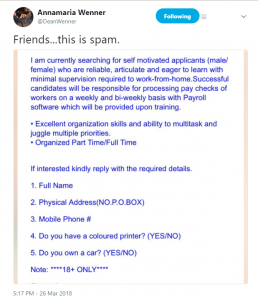 I began my marketing internship with the CO-OPS + CAREERS Department at the start of the spring semester knowing one thing; I wanted to be a part of a team. Through my time spent with the department, I can now say that team dynamics and workplace culture will most certainly be deciding factors for me when applying for and ultimately accepting a full-time job offer after graduation.
I began my marketing internship with the CO-OPS + CAREERS Department at the start of the spring semester knowing one thing; I wanted to be a part of a team. Through my time spent with the department, I can now say that team dynamics and workplace culture will most certainly be deciding factors for me when applying for and ultimately accepting a full-time job offer after graduation.
I am currently an undergraduate senior at Emmanuel College majoring in business management with a concentration in marketing and minoring in economics. And if you couldn’t already gather from my fields of study, I was unsure of what type of position I would be pursuing post-graduation. Creative marketing, specifically social media marketing, however, has been an interest of mine since high-school. I was given the opportunity through my high school’s DECA chapter to create social media marketing plans and compete against students nationwide, which ultimately sparked my love of creative marketing. I was then able to branch out into event planning through my first marketing internship at ENERGYbits. There, I oversaw coordinating a new product launch party, booking and attending multiple sports and fitness expos, and planning and marketing sponsored work-outs with the ENERGYbits team.
If I were asked to give one piece of advice to those searching for an internship or co-op, I would tell you that experience in the field you are interested in should be among your top priorities. Second to relevant work experience, you should be inspired to do what you love. I was touched by one of my marketing research professors while at Emmanuel College. She brought into the curriculum her own marketing plans and projects that she had completed for agencies over her many years in the marketing field. Her experience was something I could connect with and envision for myself. While working on marketing research projects alongside my professor, I realized my attraction to higher education. It was always in the back of my mind that I would like to teach one day, to inspire and guide students in the way that I have been throughout my academic career. It was not until my internship with the CO-OPS + CAREERS Department that I could confirm, higher education is the environment where I feel I truly belong.
This decision, I will warn you, was not an easy one. There is no straight path to your dream job and choosing a career involves strenuous self-reflection. With that, I will say that internships and co-op opportunities are essential to shaping your career path and I would not be where I am today without the academic and professional guidance I received throughout my college career. The guidance I refer to includes not only your own experiences, but informational interviews with successful alumni in your major or intended professional industry, and informational meetings with your professors and Co-ops + Career Advisors. Through my internship I have learned that you have overflowing resources here at Wentworth to help you along your career path, do not be afraid to reach out! The CO-OPS + CAREERS Department, myself included, are here to help you make the most out of your co-op experience.
As always, feel free to stop by CO-OPS + CAREERS to discuss co-op opportunities or talk professional development with your Co-op + Career Advisor. To contact us stop by 101 Wentworth Hall, email coopsandcareers@wit.edu, or call 617-989-4101.










 By: Jason Gregoricus
By: Jason Gregoricus By: Jer Jurma
By: Jer Jurma By: Caitlin Brison
By: Caitlin Brison